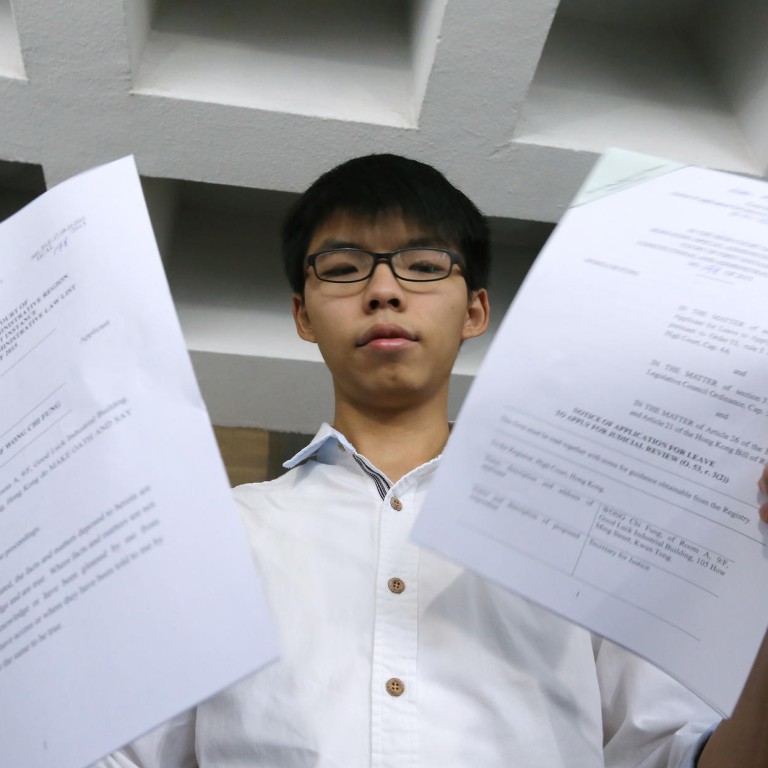
Age of reason: Hong Kong is far from being run by old men, despite what student activist Joshua Wong might think
John Chan says a minimum age requirement to stand for election to the Legislative Council doesn't prove Scholarism convenor's claim that the city is a gerontocracy
In Hong Kong, the term "old men's politics" or gerontocracy was first widely talked about in 1989 when hundreds of thousands of students gathered in Tiananmen Square demanding an end to bureaucratic corruption and the start of political reform.
In 1989, China was run by premier Li Peng , then aged 60, and party general secretary Zhao Ziyang , then aged 69. The fate of the country, however, was in the hands of the "eight patriarchs", namely Deng Xiaoping , Chen Yun , Peng Zhen , Yang Shangkun , Bo Yibo , Li Xiannian, Deng Yingchao and Wang Zhen , who were all aged 80 or over at the time.
China has since put in place mandatory retirement for Politburo members when they reach the age of 68, while for grass-roots cadres, retirement is set and strictly enforced at 60 with some sectors as early as 55. Nowadays, no one can say China is practising "old men's politics".
The term came to the public's attention again recently in Hong Kong, when student activist and Scholarism convenor Joshua Wong Chi-fung filed a judicial review on his 19th birthday challenging the minimum age requirement of 21 to stand for Legislative Council elections.
While Wong's arguments have been challenged by some scholars and politicians, his claim of 'old men's politics' in Hong Kong appears simplistic and overexaggerated
Wong claims the age threshold is contrary to the Bill of Rights Ordinance and the Basic Law. He claimed gerontocracy was serious in Hong Kong, citing that the average age of Legco members is 57, with one aged 70 still occupying an important position.
Wong's move has been widely criticised as an attempt to change the threshold for his own needs. While Wong's arguments have been challenged by some scholars and politicians, his claim of "old men's politics" in Hong Kong appears simplistic and overexaggerated.
Gerontocracy is often used to describe a country with a wide gap between the median age of the population and the average age of its leaders.

Some people claim that the wider the gap between the median age of the population and the average age of the country's leaders, the more likely it is that society will be politically unstable, as ageing leaders are unable to address the needs and aspirations of youngsters. Stable democracies, by contrast, seem to have more youthful leaders.
Take Egypt before the jasmine revolution as an example; the median age was 24, while autocratic president Hosni Mubarak was 82 before he was toppled. Similarly, there was a wide gap between the median age of the population and the average age of the eight patriarchs during the turbulent time in China in 1989.
In any talk about generational conflict, age is always a sensitive issue. In many US states, adolescents of 14 can drive but have to wait until they are 18 to vote; they can marry at 16 with parental consent, while they have to wait until they are 21 to buy a drink in a bar. Thus it would seem rather odd if a young man aged 18 or 19 could sit in Congress to decide how old a person should be before they can consume alcohol while he himself could not even enter a bar without his parents.
Similarly, some people in Hong Kong may find it hard to swallow if a 19-year-old student who has never paid income tax in his life, and is pursuing an education that is subsidised by taxpayers, sits in Legco to decide how much tax people should pay.
Just what age is considered "old" is always a matter of judgment. Yet, as grown-ups, when we say to young people, "You are too young for this", I think that, most of the time, we have a valid point.

